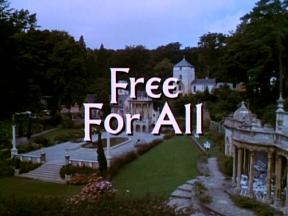 Free For All
Free For AllTransmission Date: 20/10/1967
Episode Length: 48'26m (DVD timing)/50'18m (Blu-Ray timing)
Est. Ratings: 11.1m
Written by: Patrick McGoohan (under pseudonym Paddy Fitz)
Directed by: Patrick McGoohan
DVD availability: Try amazon.com
Production Commenced:
September 1966
Production Credits:
An ITC Production by Everyman Films Ltd. Executive Producer: Patrick McGoohan; Script Editor: George Markstein; Producer: David Tomblin; Production Manager: Bernard Williams; Director of Photography: Brendan J. Stafford B.S.C.; Art Director: Jack Shampan; Camera Operator: Jack Lowin; Editor: Geoffrey Foot; Theme: Ron Grainer; Incidental Music: Albert Elms; Cameraman (2nd Unit): Robert Monks; Assistant Director: Gino Marotta; Sound Editor: Wilfred Thompson; Sound Recordist: John Bramall; Music Editor: Eric Mival; Casting Director: Rose Tobias-Shaw; Continuity: Doris Martin; Set Dresser: Kenneth Bridgeman; Make-Up: Eddie Knight; Hairdressing: Pat McDermot and Wardrobe: Masada Wilmot. Made on location and at Metro-Goldwyn-Mayer Studios, Borehamwood, England.
Starring:
Patrick McGoohan (The Prisoner); Eric Portman(Number Two); Rachel Herbert(Number Fifty-Eight); George Benson (Labour Exchange Manager); Angelo Muscat (The Butler); Harold Berens (Reporter); John Cazabon (Man In Cave); Dene Cooper (Photographer); Kenneth Benda (Supervisor); Holly Doone (Waitress); Peter Brace (1st Mechanic); Alf Joint (2nd Mechanic); Will Parry (Penny Farthing Man, uncredited); Brian Axworthy (Speedboat Pilot, uncredited); Fenella Fielding (Loudspeaker Voice, uncredited) and Robert Rietty (Voice of No.2 in titles, uncredited)
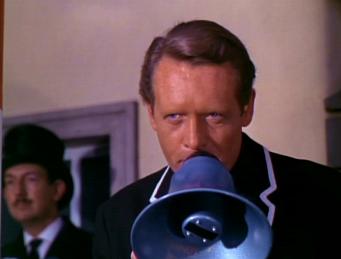
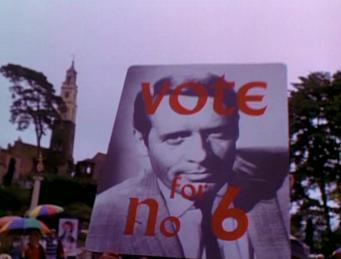
Episode Order:
Shot before Dance of the Dead and Checkmate (though around the same time), this episode was originally ranked third in this suggested episode order. However, certain dialogue passages in the three episodes, indicating that No.6 has been in the Village slightly longer in this episode, see it pushed back from third to fourth place for a 2017 revising.
No.6:
The first real indication that No.6 was a spy is given, as he describes the rest of the villagers as having "held positions of a secret nature" and waiting to have that information protected or extracted. He admits he is in the same position. There is also a real sign, hinted at in earlier episodes, that No.6 is misognyist. He is assigned a new maid, No.58 (Who No.2 claims has a photographic memory and used to work "in records"), who cannot speak English though her country of origin is unspecified. Asked why a non-English speaking maid was assigned to him, No.2 claims that it was for the best "knowing your... shall we say... prejudices?" His aggressive attitude towards women throughout the series is certainly suspect. However, having said this, the comment could easily be an innocent one merely referring to No.6's hostility towards the Village as a whole.
We are also made aware of a medical report which states that No.6 gave up sugar four years and three months before the episode takes place "on medical advice".
In The Village:
The Village newspaper, The Tally Ho, is named for the first time by one of its reporters. The reporter also mentions that the Village conducts "exports". We also see the council room, where a council of eight vegetablised councillors, ranging from No.2a to No.2i, are resided over by No.2. Under this council chamber we see more of the Village underground, where a red-lit corridor leads to a torquoise interrogation room, run by a man who is ex-civil service. There is also the introduction of a bar, "The Cat and Mouse", which serves non-alchoholic drinks, and an underground cave with no cameras which No.2 dubs "The Therapy Zone". There is also a bizarre exchange where No.2 calls up No.6 to on a videophone from the Green Dome to ask to speak to him. On being told "the mountain can come to Mohammed", No.2 appears instantly at the door.
Perhaps the most important bit of information is No.2 speaking on the phone to a colleague, presumably No.1, about the possibility of damage to No.6. He explains that he was being careful in his treatment of No.6, but that he "couldn't jeopardise the whole project". This is one of the few references to the Village being there for a higher purpose than just No.6, particularly in an episode which seems exclusively about him. Also, at the episode's conclusion, the doorway from No.2's control chamber to the residential suite of the green dome opens... only this time to lead to an underground cave system!
Rover:
Rover makes several appearances in the episode, floating down from the top of a tall building at first. After another confrontation with No.6, we see that it has either: (a) Divided itself into a large Rover and two smaller Rovers to carry No.6 to the shore; or (b) Being joined by two other creatures of its own nature, only smaller. It is not specified which of these is the correct option. This is also the only time we see Rover recalled, with a reversal of the film to show it returning to the sea bed. Finally, at the conclusion in the cave room (see "In The Village" entry, above) a glowing Rover is hovering, while four men in sunglasses sit round it, apparently in worship.
Storyline:
No.6 agrees, at No.2's request, to stand against him in an election for the new No.2. "It'll give me something to do until I get to leave this place" explains No.6. However, throughout the episode he is kept sedated through a series of drugs, tranquillisers and hypnotic submission. In so doing, we get a relatively docile No.6 who goes along with the system, acknowledges his number and even willingly gives the "Be Seeing You" salute.
Escape:
No.58 is the new No.2, the whole of the election having been arranged merely as a ruse to show No.6 the extent of the Village's power. He is beaten and returned to his home, while the new No.2 makes her report to the old No.2. Mysteriously, she tells him to "give my regards to the homeland".
Some close followers of the series have suggested that there is a significance to the number of slaps she gives No.6 in order to wake him up from his hypnotic state - seven.
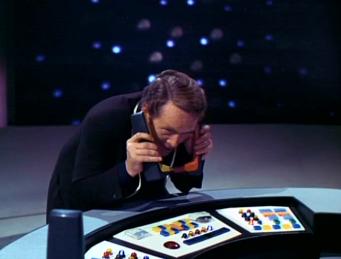
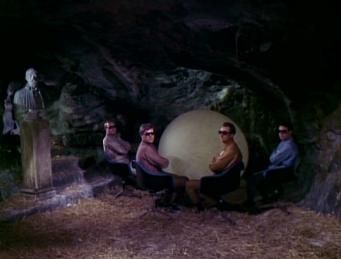
"Unlike me, many of you have accepted the situation of your imprisonment and will die here like rotting cabbages!"
Viewpoint:
For some reason there's always been something that holds me back from regarding Free For All as a top flight Prisoner episode. Certainly in an age where New Labour seems very much like old Conservatives, then there's still mileage in a political parody where the votes lead to only one path. However, while witty, the satire on show � including the journalist interview � is very broadly painted. It's also one of the brighter, more garish episodes, which I realise is the point, but a darker episode (like the scenes in the underground) could have benefited. Portman � who is clearly ill and died of a heart condition shortly afterwards in December 1969 � is a little underwhelming compared to some of the other No.2s, though that's understandable.
Yet if this review sounds like over-criticism, then it's really not meant to. This is still a well made, well acted and competent episode of arguably the greatest television series of all time, and has much to recommend it. It's just to Free For All's misfortune that the series would produce even greater highs.



